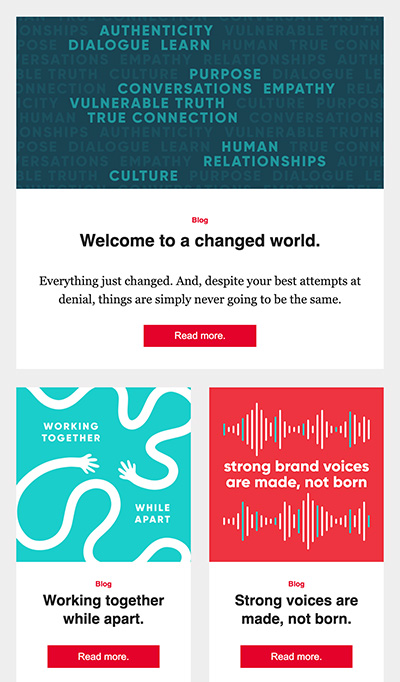Strong brand voices are made, not born
Strong brands have strong voices. They choose their words carefully, they stay in character, and when they speak to their audiences, their audiences understand them.

A brand’s voice is its personality. If it’s effective, it is instantly recognizable to that brand’s audience because its language, its tone, and even its quirks are consistent. If it’s really effective, it sparks affection, inspires emotion, builds trust, and earns loyalty.
Think: Apple’s confidence. Coca-Cola’s whimsy. Red Bull’s pithiness.
Strong brands have strong voices. They choose their words carefully, they stay in character, and when they speak to their audiences, their audiences understand them.
Problems arise when a brand’s voice veers off into the unknown and becomes unfamiliar. I liken it to when a friend of mine spent a semester abroad in the UK and came back pronouncing garage as “GARE-aj” and calling cookies “biscuits.” Small changes like this can be discombobulating, even a little alienating.
How does this happen with a brand?
Often it’s because a distinct voice was never established in the first place. You can’t keep your voice if you’ve never found it to begin with. Because strong brand voices are made, not born. They don’t just come to be — they’re crafted, they’re intentional, they know exactly who they are trying to get through to.
Brands with strong voices honor their own standards. They’re disciplined. They maintain guidelines that can be easily understood and followed by anyone within the company who crafts communications. A strong brand voice doesn’t go off the rails when a new copywriter or creative director comes in because it doesn’t leave much room for that new voice to butt in and take it over.
The clearest, most successful brand voices are developed by brands who do the necessary work:
- They identify their audiences and learn all they can about them.
- They craft a well-rounded personality that appeals to their audiences.
- They develop a vocabulary based on that established personality.
- They decide on the level of formality they’ll adopt (this helps inform that vocabulary).
- They make sure that the qualities they’ve decided on come through in every communication — yes, every communication — to avoid that “Who even are you?” moment.
Does that mean a brand’s voice must remain stagnant? Not at all. A brand’s voice can and should evolve and adapt to a shifting culture, but it must always be true to its core. If it’s optimistic and fun, it should be optimistic and fun no matter the setting or the era.
A strong brand voice knows what to say and how to say it. It consistently speaks to its audience’s passions and never loses its own.


